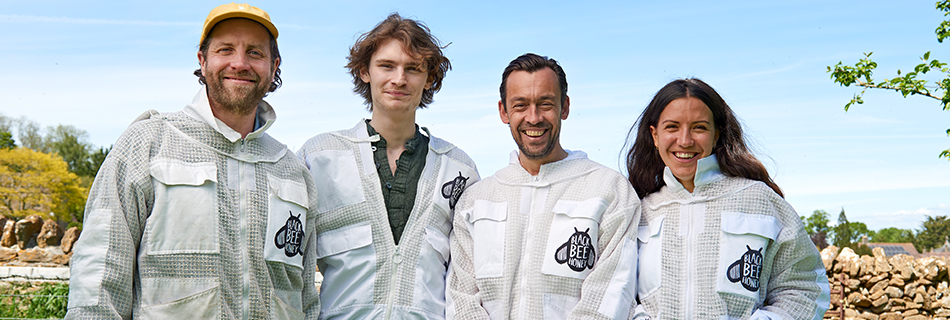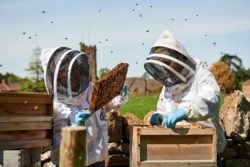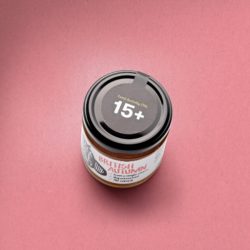Black Bee: Putting the Bee in British Honey

Izzy Motley is Sustainability and Sales manager at Black Bee Honey, a company providing raw, single origin British honey. As well as sourcing honey from their own hives in Somerset and London, they also work with beekeepers in other parts of the UK that share their ethical beekeeping ethos.
 Honey comes in a variety of flavours and textures and is produced by beekeepers and companies in a variety of ways, in most countries in the world. It’s difficult to imagine honey production as anything but intrinsically sustainable because at face value beekeepers give their lives to maintaining the bee population, in turn taking some of the honey that they produce. But as with most things there’s a spectrum in regards to the ethics of production. At one extreme, there is mass produced honey, sourced from apiaries usually located in China (the largest honey producing nation in the world), which is blended to a flavour profile (meaning it’s impossible to know exactly where the honey you’re consuming is produced), pasteurised (removing most, if not all, health properties) and then usually packed inside a plastic squeezy bottle.
Honey comes in a variety of flavours and textures and is produced by beekeepers and companies in a variety of ways, in most countries in the world. It’s difficult to imagine honey production as anything but intrinsically sustainable because at face value beekeepers give their lives to maintaining the bee population, in turn taking some of the honey that they produce. But as with most things there’s a spectrum in regards to the ethics of production. At one extreme, there is mass produced honey, sourced from apiaries usually located in China (the largest honey producing nation in the world), which is blended to a flavour profile (meaning it’s impossible to know exactly where the honey you’re consuming is produced), pasteurised (removing most, if not all, health properties) and then usually packed inside a plastic squeezy bottle.
At Black Bee Honey, our values and beekeeping ethos places us far away from this extreme. Having a short, transparent supply chain is extremely important to us, and we love to let our customers know exactly which beekeeper at which apiary helped create the honey, displayed as a stamp on every jar. Whilst we may not be organic certified due to being a British honey company (currently the UK doesn’t have a large enough space of organic land to create organic honey), we produce and source honey from areas with low or no pesticide use, such as regenerative and organic farms and national parks. I would go into the science behind how bees choose the plants they visit, which in turn gives us a good understanding of whether the honey is organic, but I would go way over the word count for this blog! Maybe a topic for the next one?
 Although our honeys are produced in a few different apiary locations, all of it experiences the same minimal processing. We never pasteurise or fine filter the honey, meaning it retains all the powerful antimicrobial properties (measured by a Total Activity (TA) score, which is displayed on the lids), and different pollens too. As previously mentioned, we stamp each jar with the individual beekeeper who helped to create it and the apiary location. This means that consumers can get a feel for exactly which type of honey from which location they like the most. For example we have a couple of heather honeys (named British Autumn and British Heather), which taste and look very different due to being sourced from different locations.
Although our honeys are produced in a few different apiary locations, all of it experiences the same minimal processing. We never pasteurise or fine filter the honey, meaning it retains all the powerful antimicrobial properties (measured by a Total Activity (TA) score, which is displayed on the lids), and different pollens too. As previously mentioned, we stamp each jar with the individual beekeeper who helped to create it and the apiary location. This means that consumers can get a feel for exactly which type of honey from which location they like the most. For example we have a couple of heather honeys (named British Autumn and British Heather), which taste and look very different due to being sourced from different locations.
In addition to the product itself, the way we keep bees and run the business are well aligned with the Better Food’s ethos. There are various pests and diseases that bees are subject to, and we use natural remedies to help prevent and treat them. For example, to prevent wax moth we pop bay leaves in between frames. And to prevent swarming we regularly inspect the hives to ensure they have enough space to expand, as opposed to clipping wings to avoid the queen flying away.
Whilst we understand that few companies are perfect, we’re constantly evaluating and adapting how we operate in an attempt to be as sustainable as possible, and the B Corp application process has helped with this. We hope to be a certified B Corp company by the end of the year, in addition to being the UK’s first carbon neutral honey company. Looking at the bigger picture, we want to be more than a company that produces tasty ethical honey, we want to do something substantial that will have a real impact on pollinators as a whole. To make this a reality we’ve got an exciting long term project in the pipeline to put +2% of revenues each year to create wildflower meadows… stay tuned, and we can’t wait to share it with you all!!
Read Black Bee Honey’s supplier directory page
